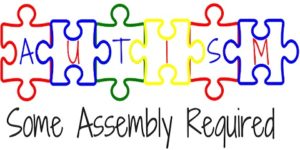2 years – 5 years Old (or when your child enters school) To-do’s:
Did you know that according to the CDC, your child does NOT need a medical diagnosis to be evaluated for state funded early intervention services?
If you suspect your child has autism traits or meets the criteria of an autism diagnosis, make early contact with the Early Intervention service agency in your location/state.
Every state has them.
I know there are a bazillion checklists available to reference early signs of autism, but below are just a few of the things to look for:
- Does not respond to name
- At times, appears to be deaf
- Speaks with an unusual tone or rhythm
- Repetitive motions, such as rocking, spinning, or hand flapping
- Easily upset with changes in routine
- Walks on toes
- Unusual attachments to objects or schedules
- Doesn’t know how to play with toys
- Doesn’t return a smile
- Resists cuddling or doesn’t know how to appropriately respond to affection
- Doesn’t reach to be picked up
- Poor eye contact
- Prefers to play alone or with adults
- Lines up toys or other objects
- Doesn’t speak
- Regression
- Loss of speech, babbling, gestures, or social skills
IDEA
If your child has been diagnosed with autism by a trained clinician, Federal Law (IDEA; Individuals with Disabilities Education Act) ensures that children who meet age requirements and requirements related to their ability, have the option to access free services.
In Mom language, this means that a diagnosis of autism alone does NOT mean your child can access free services.
Your child must also demonstrate a need for specialized services.
Make contact with Early Intervention services and ask for an Infant and Toddler Early Intervention evaluation.
Here Is What Happens
You will sign a document giving permission to evaluate your child.
This is usually called PTE or Permission to Evaluate. Laws vary per state, but in most states the evaluation must be completed within 60 days of you signing the document.
You should submit any and all checklists you have personally completed, and any medical documentation you have to the Agency completing the exam.
YOU know your child best.
It is important to inform the Agency of your observations.
Your child will be assessed based upon categories:
- School
- Behavioral
- Emotional skills
- Abilities.
If the team (usually called an MDE; Multidisciplinary Evaluation team) does not have the qualifications to assess in all areas, they are required to hire outside sources for the assessment.
This is at THIER expense not YOURS.
Reference the law if needed.
Once the evaluation is completed you will receive an ER (Evaluation Report).
This report will confirm whether your child qualifies for early intervention/special education services.
If your child does qualify, the team will then meet and an IEP (Individualized Education Plan/Program) will be written. This plan describes your child’s needs and how those needs will be met.
DO NOT sign the IEP if you don’t agree with the plan or interventions.
The team as a whole must agree on the best course of treatment, and you are part of that team.
If you feel that your child should qualify, but the Evaluation Report states that your child doesn’t meet criteria for pre-school special education services, follow the Agencies “dispute resolution” policy.
Locate A Developmental Pediatrician To Meet With Your Child.
The Pediatrician can help identify challenges your child currently may have or is suspected to have.
They will determine a course of action to address and/or remove those barriers.
Be aware that although you don’t have to agree or take all advice of a Developmental Pediatrician, it is in the best interest of your child to explore all options presented by Professionals and make the best educated decision for your child.
They are professionals for a reason.
That being said, do not be afraid to fire your Pediatrician either. If you don’t jive, you don’t jive.
It is imperative to find a pediatrician that will listen to you and with whom you feel comfortable giving and receiving information from.
Devise A Plan
It may sound silly, but it is very important to devise a plan to inform your family/support system about your child’s diagnosis.
I hate to say it, but it’s true:
You WILL encounter people who do not understand autism and therefore will not support a diagnosis of autism for your child.
As the primary caregiver for your child, YOU will be aware of idiosyncrasies and traits of your child that others will not.
Educate these peeps!
I’ve got to be honest with you.
Some people are never going to get it. Accept this now.
This doesn’t mean those individuals don’t love or care for you and your child. It could mean that they need more time to process, are grieving, or simply choose not to believe in such a diagnosis.
Regardless the situation do not let this detour you from the path of growth for your child. YOU, yourself need to:
- Confide in your significant other.
- Build a network with trusted people/friends and TELL THEM what you need.
- Seek services from a Professional
- Join a support group.
Find Appropriate Child Care
You want to ensure that the individuals who care for your child while you are away, are educated and vigilant.
Ask questions.
As parents we all know to verify that caregivers don’t have criminal histories that involve children, that caregivers are CPR certified and that they have first aid training.
It is important however, to ensure that a caregiver for your child diagnosed with autism has additional training and understanding.
Care.com is a national website that offers childcare resources for children with a diagnosis. This is also where your networking comes in.
Ask your support groups, ask at church, ask the staff at your Early Intervention Agency.
Start your child’s “Sam I Am” book.
Okay, you don’t have to call it “Sam I Am” but my kiddo loved Dr. Seuss and that is what we called it.
This book should be comprised of anything and everything someone would need to know if all the sudden you weren’t here (God forbid!).
It should include Physician names, educational documents, testing, etc. This book will grow so make sure it is big enough to handle documents and information that will grow with your child.
Final Thoughts
If your child has been officially diagnosed with Autism apply for state funded insurance such as Medicaid.
In most states the diagnosis of a disability before the age of 22 results in the automatic qualification of Medicaid. Medicaid coverage will afford your child (and you) other services and resources as your child ages.
Do this now regardless of whether your child has other health coverage or not.

